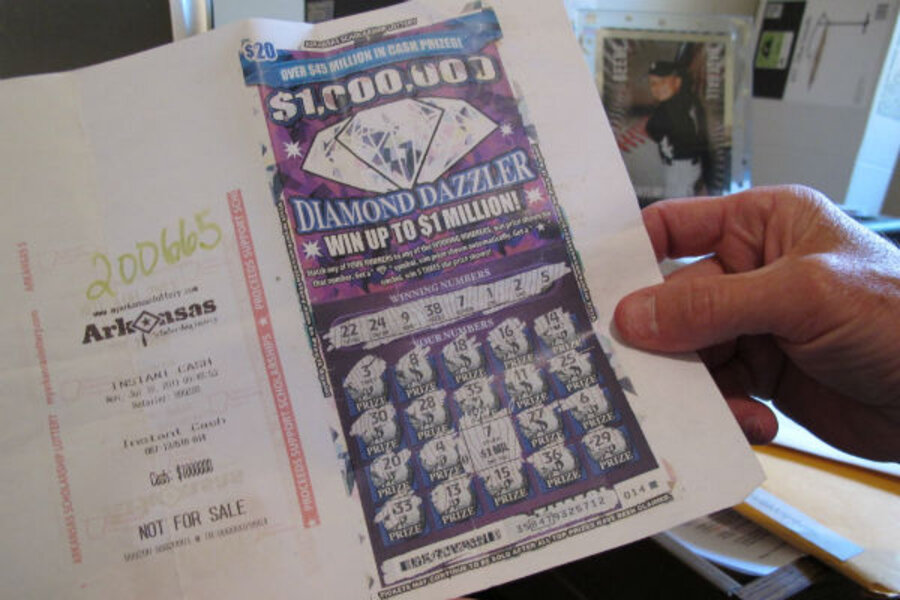To play or not to play: Is that Powerball ticket worth it?
Loading...
Julie writes in:
I would love to see you run the numbers on playing the lottery. My mother spends $20 a week on Powerball. I keep telling her she’d be better off putting that $20 a month into a savings account, but I might as well be talking to the wall.
Lotteries wouldn’t exist if they didn’t turn a profit. If you spend $1 on a lottery ticket, the lottery is going to keep at least some portion of that money. In addition, another portion of that money is spent on maintaining the lottery – the machines, the paper, the software, the employees, and other expenses.
How bad is it, though?
The odds on a normal Powerball play are as follows:
The odds of winning a $4 prize (just matching the Powerball) are 1 in 55.41.
The odds of winning a different $4 prize (Powerball plus one number) are 1 in 110.81.
The odds of winning a $7 prize (Powerball plus two numbers) are 1 in 706.43.
The odds of winning a different $7 prize (three numbers) are 1 in 360.14.
The odds of winning a $100 prize (Powerball plus three numbers) are 1 in 12,244.83.
The odds of winning a different $100 prize (four numbers) are 1 in 19,087.53.
The odds of winning a $10,000 prize (Powerball plus four numbers) are 1 in 648,975.96.
The odds of winning a $1,000,000 prize (five numbers) are 1 in 5,153,632.65.
The odds of winning the jackpot (Powerball plus five numbers) are 1 in 175,223,510.00.
What we’re interested in is the expected value of a lottery ticket. In other words, if you buy a lot of tickets, how much can you expect to win per ticket?
For example, if you buy 55.41 tickets, you should expect to win a $4 prize. That means that for each ticket you bought, you should expect to win 7.2 cents of that prize, on average.
The expected value from the $4 prize (just matching the Powerball) is 7.2 cents.
The expected value from the other $4 prize (Powerball plus one number) is 3.6 cents.
The expected value from the $7 prize (Powerball plus two numbers) is 1.0 cents.
The expected value from the other $7 prize (three numbers) is 1.9 cents.
The expected value from the $100 prize (Powerball plus three numbers) is 0.8 cents.
The expected value from the other $100 prize (four numbers) is 0.5 cents.
The expected value from the $10,000 prize (Powerball plus four numbers) is 1.5 cents.
The expected value from the $1,000,000 prize (five numbers) is 19.4 cents.
In other words, ignoring the jackpot, you should expect an average return of $0.36 on every $1 Powerball ticket you buy.
The lottery grand prize would have to be gigantic in order to give you an average return of $1 on each ticket you buy. In fact, the jackpot would have to be $112 million in order for you to get an expected value of $1 on each ticket you buy.
Another problem: this doesn’t include taxes. Once you get above the $100 mark, a significant portion of the prize is going to be taken in taxes. If you assume 35% of the prize is taken in taxes for each of those prizes, you’d have to have a jackpot of $194 million in order to have an expected value of $1 on each ticket you buy.
Yet another problem: this doesn’t include split jackpots. Most large jackpots involve two or three groups winning the prize, which splits the amount any one of them wins. So, you’d have to win that giant jackpot with no other winners to get a good expected value.
In other words, an expected value of $1 on a lottery ticket isn’t going to happen. Even with a giant jackpot, you’re almost assuredly not going to get an expected value of $1.
But what do you even get with a lottery ticket expected value of $1? You get a terrible investment, that’s what.
Imagine you could buy an investment where 31 out of 32 times, you lose all your money. Even worse, no amount of information can help you figure out which of those 32 times is going to be the winner. That’s essentially what a lottery ticket is, even one with expected take-home prizes totaling $1. No one would invest money in that.
In fact, if the jackpot is less than $100 million, you’re actually better off putting your money into a slot machine in a typical casino. Most casinos have an expected value of about $0.91 to $0.95 in their slot machines for every dollar played.
If you put your money in a savings account, you keep that dollar and put about one cent in there on top of it each year. That’s better than a slot machine and far better than a lottery ticket.
So, why do people ever play the lottery? They play it for hopes and dreams, that’s why. If you see someone playing the lottery, it’s because they’re dreaming of a situation where they get rich very quickly and thus are able to turn around their current situation in some fashion.
Your mother isn’t playing the lottery because of the investment potential. It’s pretty easy to see that it’s a terrible investment. She’s playing it for emotional and psychological reasons.
Now, is that a good use of money? As an investment, it’s terrible. However, everyone spends some of their money on something completely wasteful. If your mother has the rest of her financial house in order and is in a good financial place, I wouldn’t begrudge her this expense if it bring her some joy and peace. I would only worry about it if she’s experiencing financial troubles.








